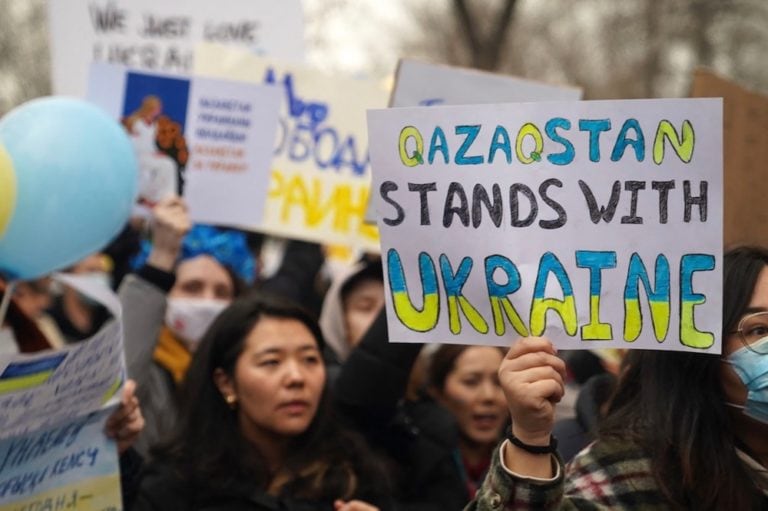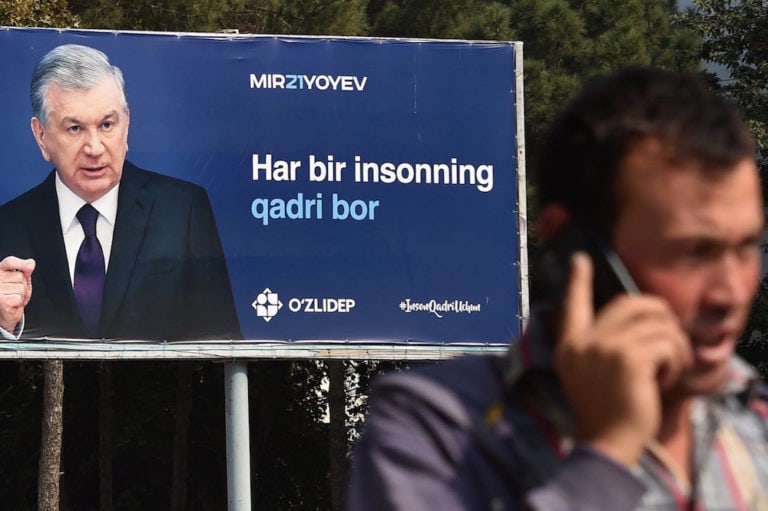A court in the Tashkent district of Hamza recently convicted independent journalist Viktor Krymzalov in connection with an unbylined article on the Centrasia.ru independent news website which the plaintiff “assumed” he wrote. No evidence was presented to support the assumption.
(RSF/IFEX) – 4 April 2012 – A spate of incidents in the past few weeks has again highlighted the degree to which independent journalists are exposed to arbitrary persecution and abuses on the part of the authorities in Uzbekistan.
“This latest wave of harassment comes at an already fraught time for the media,” Reporters Without Borders said. “Ten journalists are currently in prison in Uzbekistan, those who are not detained are prey to tyranny and fear, and independent reporting has been almost totally suppressed.
“As President Islam Karimov is reportedly planning a visit to Germany, we strongly urge Chancellor Angela Merkel to insist on a number of ‘political conditions’ before agreeing to receive him. The release of imprisoned journalists and an end to the harassment of independent media should be high on the list. It is time the European Union resumed its firm position on respect for human rights in Uzbekistan after too quickly sacrificing it for politically-ineffective concessions.”
The autocratic Karimov regime’s harassment is becoming very inventive and includes a growing tendency to prosecute journalists for things they did not write. On 26 March, a court in the Tashkent district of Hamza convicted independent journalist Viktor Krymzalov in connection with an unbylined article on the Centrasia.ru independent news website which the plaintiff “assumed” he wrote. No evidence was presented to support the assumption.
Both the article – about the expropriation of Tashkent retiree Viktor Kirinos – and the comments posted by readers were deemed to have been defamatory and the court fined Krymzalov the maximum amount for defamation – 3.78 million soms (1,500 euros). He plans to appeal.
Independent journalist Elena Bondar was summoned on 30 March to a Tashkent police station where an inspector told her she was being charged with “inciting national, racial, ethnic or religious hatred.” If she cooperated, she would be tried before a civil court, but if she refused, criminal charges with a maximum sentence of 10 years in prison would be brought against her, the inspector said.
The charge is based on the claim that it was Bondar who sent letters to several news media about alleged government harassment of a local branch of Russia’s Tyumen University. The letters argued that Uzbekistan’s Russian-speaking population was the real target of this harassment.
In fact, Bondar had received one of the letters and had begun to investigate its claims for the independent Russian-language news website Fergananews in September 2011, but soon dropped the story after deciding the information was fabricated and did not write anything on it for Fergananews.
Bondar has not been working as a journalist for very long but has already had an extended wrangle with the authorities in connection with her activities. She was briefly detained and charged on her return from an OSCE journalism seminar in neighbouring Kyrgyzstan in August 2011 and has been subject to constant harassment ever since.
The authorities keep a close watch on journalists entering and leaving the country and, for the first time since 2005, recently resumed denying entry to journalists with proper visas. Victoria Ivleva, a Russian reporter who works for the Moscow-based independent tri-weekly Novaya Gazeta and who won the World Press Photo Contest in 1991, was denied entry on her arrival at Tashkent airport on 23 March. She had planned to spend six days in Uzbekistan and hold a photo workshop.
“I was not allowed to make a phone call or contact the Russian consulate,” she told Reporters Without Borders. In the absence of any official explanation, Ivleva assumes she has been put on a blacklist because of critical articles she wrote several years ago or because of her support for Umida Akhmedova, a documentary filmmaker and photographer who was harassed by the Uzbek authorities.
Natalia Anteleva, a BBC reporter who is Georgian, was also turned back when she flew to Tashkent for a private visit on 1 March. She was given no explanation aside from a written notice saying that she was “denied entry into the Republic of Uzbekistan.” She has in the past done several reports critical of the Karimov regime.
Alexey Volosevich, an independent journalist, was briefly detained in Tashkent on 28 March for refusing to show his passport to police on duty at the entrance to the US embassy. Since 2008, everyone visiting the embassy has been systematically checked by the Uzbek police although they have no legal grounds for doing this.
When the Uzbek authorities start persecuting a journalist they often cannot stop. Mohammed Bekzhanov, the onetime editor of the opposition newspaper Erk, was due to have been released in February after nearly 13 years in detention but he was sentenced to another four years and eight months in prison on 24 January on a charge of refusing to comply with the demands of prison officials (article 221 of the criminal code).
Arrested in March 1999, tortured and jailed in Kasan, in the south of the country, Bekzhanov is now one of the world’s longest-held journalists.
Meanwhile, there is still no news of the independent journalist Jamshid Karimov, who went missing in mid-January after being released from the psychiatric clinic in which he had been forcibly confined since 2007.
Reporters Without Borders reiterates its call for the release of all of the following journalists:
• Held since 21 January 2010 – Khayrullo Khamidov – Nawruz (radio)
• Held since 22 February 2009 – Dilmurod Sayid – Ezgulik
• Held since 16 February 2009 – Bakhrom Ibragimov – Irmok
• Held since 16 February 2009 – Davron Kabilov – Irmok
• Held since 16 February 2009 – Ravshanbek Vafoev – Irmok
• Held since 16 February 2009 – Abdulaziz Dadakhonov – Irmok
• Held since 16 February 2009 – Botyrbek Eshkuziev – Irmok
• Held since 7 June 2008 – Solidzhon Abdurakhmanov – freelancer
• Held since 15 March 1999 – Jusuf Ruzimuradov – Erk
• Held since 15 March 1999 – Mohammed Bekzhanov – Erk


